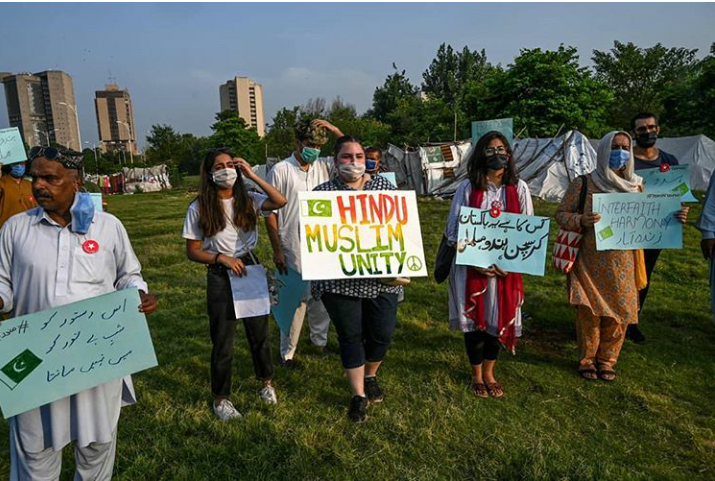Meanwhile, the debate about the construction of a new temple in Islamabad continues, The Pakistan Ulema Council (PUC), an umbrella group of Muslim organizations in Pakistan has extended support to the construction of a temple in Islamabad and criticized those who were making the issue controversial on July 10.
Pakistan Ulema Council (PUC) has extended support to construction of a temple in Islamabad & criticised those who were making issue controversial.
“We denounce the controversy over construction of the temple. This [making it controversial] by extremist clerics is not correct. pic.twitter.com/IyW9N8KPel
— Developing Pakistan (@developingpak) July 11, 2020
“We denounce the controversy over the construction of the temple. This by extremist clerics is not correct. PUC will call a meeting and will also present its point of view to the Council of Islamic Ideology (CII),” Dawn quoted the PUC chairman Hafiz Mohammad Tahir Mehmood Ashrafi as saying.

He argued that since the state supports the construction of mosques, it should also support the places of worship of other religions because all Pakistanis pay taxes and do their duty by the country.
Senator Mustafa Nawaz Khokhar of the Pakistan People’s Party, who chairs the Senate Committee on Human Rights, told The Wire: “Hindus are citizens of Pakistan and have the right to build a temple. I wonder why they require permission.”
Following the decision to construct a Hindu temple in the country’s federal capital Islamabad, some hardline extremists spoke against it. Therefore, bowing to the pressure Imran khan government halted the construction work and referred the issue to the Islamic ideological council. Ironically, Islamabad High Court (IHC), comprising justice Umar Farooq, on late Tuesday reserved its judgment in favour of constructing Shri Krisna temple, in the country’s federal capital Islamabad.

Nawaz Khokhar said the government’s letter to the Council of Islamic Ideology (CII) was illegal and unconstitutional. The ruling party did not consult the members of parliament before asking for the CII’s advice, he said, referring to Article 229 of the constitution which states: “The president or the governor of a province may, or if two-fifths of its total membership so requires, a house or a provincial assembly shall refer to the Islamic Council for advice on any question as to whether a proposed law is or is not repugnant to the Injunction of Islam.”
The chairman of PUC (Pakistan Ulema Council), Hafiz Ashrafi, who is also the chairman of Muttahida Ulema Board, Punjab, added that the Hindus living in Pakistan were not residents of any conquered land; therefore, the interpretation presented by certain clerics about the rights of non-Muslims in Shariah is not applicable to Hindus and members of other religious minorities living in the country.
“To have their own place of worship and offer life as per their faith and tradition are the right given to all non-Muslims in the Constitution and as well as in Shariah,” he said, adding: “Those opposing the construction of the temple have an incorrect interpretation of Shariah.”
The Pakistan Ulema Council has been vocal against violence and extremist behaviours against the non-Muslim citizens of the country and has been playing a frontline role for interfaith harmony in the country and they will continue to do so, according to Hafiz Ashrafi, the chairman of PUC.
TahirMahmoodAshrafi حافظ محمد طاهراشرفى@TahirAshrafi#Pakistan Ulema Council playing frontline force role for interfaith harmony and for promotion of interfaith dialogue in the country since it’s inception.4:43 AM · Jul 11, 2020
The ideology of PUC lies on the non-violence and moderate behaviours towards the minorities of the country, he said and that there is no harm or threat to the faith or any other risk involved in establishing a place of worship for the non-Muslim minorities, he added.
Referring to Kartarpur Corridor for Sikh Pilgrims, a project backed by the government, he asks, “Did anybody observed any threat to Islam – No.”
Hafiz Ashrafi told that Mutahida Ulema board had not only turned down 105 cases of blasphemy allegations against the people of religious minorities in pursuit of vested interest but also warned the complainants in a few cases against lodging false complaints.
Later, he announced that the PUC in coordination with the World Peace Council will soon host a convention in Islamabad in which representatives of different religious schools of thought and religions will be invited.
We’ll get through this! Meanwhile, here’s all you need to know about the construction of Shri Krishna Temple in Islamabad. You can check out our earlier report on this issue.
It is heartwarming to see that the PUC is supporting the right of Pakistani Hindus to build temples. Let us know what you think in the comments!
[zombify_post]





